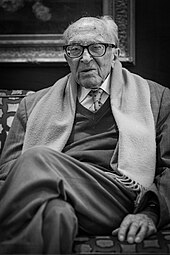Boris Pahor
Boris Pahor (born August 26, 1913 in Trieste , Austria-Hungary ) is an Italian writer of the Slovenian language.
Life
After Trieste was annexed to Italy in 1918, Pahor, who belonged to the Slovenian minority, had to watch the fascists set fire to the Slovenian cultural center ( Narodni Dom ) in 1920 . After attending the Slovenian elementary school, the use of his mother tongue was forbidden under Mussolini . He attended the grammar school in Koper and the seminary in Gorizia , where he studied theology for two years. In 1940 he was drafted and used in the Italian colony of Libya . In Italy he then worked as an interpreter for captured Yugoslav officers in Bogliaco on Lake Garda . After the coup against Mussolini, he returned to Trieste in 1943 to join the liberation movement; on January 21, 1944, however, he was arrested by the Domobrancen militia and shortly afterwards taken to the Dachau concentration camp . Until the end of the war he lived through the Natzweiler-Struthof concentration camp , the Mittelbau-Dora concentration camp and the Bergen-Belsen concentration camp . He processed the concentration camp trauma in novellas , from which his award-winning novel “Nekropolis” emerged in 1967 (translations into German, Italian, French, English, Catalan and Esperanto ).
After his release he studied in Padua , where he received his doctorate with a thesis on the Slovenian poet Edvard Kocbek . From 1953 to 1975 he taught at a grammar school in Trieste. In 1955 he published the novel "Villa am See" and "The City in the Bay" ("Mesto v zalivu"), in 1956 "Nomads without an oasis" ("Nomadi brez oaze"). In 1975 he published the novel “In the Darkness” (“Zatemnitev”), in 1978 the autobiographical novel “Fight with Spring” (“Spopad s pomladjo”); first in 1958 under the title "Beyond Hell are people" ("Onkraj pekla so ljudje", German 1997), which dealt with the experiences of the concentration camp, and in 1984 "V labirintu" ("In the labyrinth") as well as the literary historical studies " Srečko Kosovel ”(Pordenone 1993) and“ Letteratura slovena del Litorale. Vademecum. Kosovel a Trieste e altri scritti ", Trieste 2004. For many years he was editor of the magazine" Zaliv "(" The Bay "). In 2004, the Kitab publishing house in Klagenfurt began to systematically publish its work in German translation.
Novellas have also been translated into Hungarian and Serbo-Croatian. In 1984 his letters to Edvard Kocbek were published from 1940 to 1980 . In 2001 he received the prize of the SWR best list . His reflective narrative style is mentioned in the same breath as Primo Levi , Jorge Semprún and Imre Kertész . Pahor is considered to be one of the most internationally known representatives of critical contemporary Slovene literature.
Since 2009 Pahor has been a full member of the Slovenian Academy of Sciences and Arts . He lives in the Prosecco suburb of Trieste.
Works
Published in German translation:
- Fight with spring. Klett-Cotta, Stuttgart 1997, ISBN 978-3-608-93399-4
- Necropolis. Berliner Taschenbuch-Verlag, Berlin 2001, ISBN 978-3-8270-0408-6
- Flowers for a leper. Kitab , Klagenfurt 2004, ISBN 978-3-902005-38-0
- The city in the bay. Kitab, Klagenfurt 2005, ISBN 978-3-902005-42-7
- Piazza Oberdan. Kitab, Klagenfurt 2009, ISBN 978-3-902585-24-0
- The cradle of the world. Kitab, Klagenfurt 2009, ISBN 978-3-902585-50-9
- In the labyrinth . Hermagoras Mohorjeva, Klagenfurt, 2009 ISBN 978-3-7086-0480-0
- Nomads without an oasis , translated by Urška P. Cerne and Matthias Göritz ; Hermagoras Mohorjeva, Klagenfurt, 2009 ISBN 978-3-7086-0481-7
- The Darkening , translated by Urška P. Cerne and Matthias Göritz; Hermagoras Mohorjeva, Klagenfurt, 2009 ISBN 978-3-7086-0457-2
- Villa on the lake . Hermagoras Mohorjeva, Klagenfurt, 2009 ISBN 978-3-7086-0479-4
- Secret language gifts , translated by Urška P. Cerne and Matthias Göritz; Hermagoras Mohorjeva, Klagenfurt, 2009 ISBN 978-3-7086-0458-9 .
- with Cristina Battocletti: Figlio di nessuno . Rizzoli, Milan 2012, ISBN 978-88-89100-67-7 .
literature
- Wilhelm Baum: Triestine Realities. About the Trieste writer Boris Pahor , in: Bücherschau 183, 2009, pp. 12-16.
- Wilhelm Baum: Boris Pahor. A Slovenian writer in Trieste , in: Podium , Issue 155/156, 2010, pp. 170–183.
Web links
- Literature by and about Boris Pahor in the catalog of the German National Library
- Literature by and about Boris Pahor in the bibliographic database WorldCat
- “Let's find another meaning” Boris Pahor in an interview with Martin Reichert, In: www.taz.de, November 18, 2018
Individual evidence
- ↑ FAZ of December 27, 2010, page 24: The city of winds and the heroes of resistance
- ↑ a b biography at kitab-Verlag (October 20, 2008)
- ^ Letter in Trieste, i.e. at the fault line in FAZ of August 26, 2013, page 32
| personal data | |
|---|---|
| SURNAME | Pahor, Boris |
| BRIEF DESCRIPTION | Slovenian-speaking writer in Italy |
| DATE OF BIRTH | August 26, 1913 |
| PLACE OF BIRTH | Trieste |
